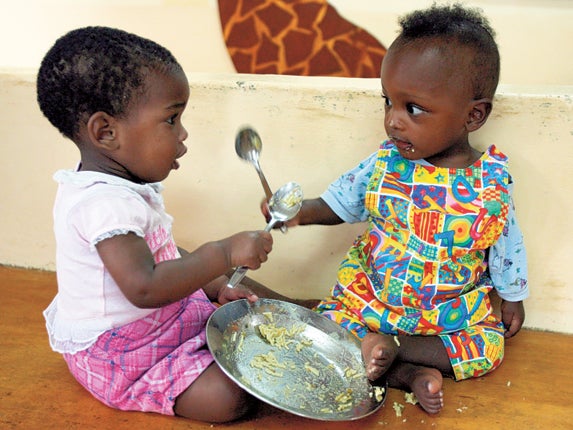Press handouts can save the lives of children
Western subsidies help Tanzanian reporters expose health risks to babies and fight against Aids, says Kevin Rafter

It's an unlikely setting for a pioneering journalistic endeavour. A dusty, ramshackle compound outside Dar es Salaam dominated by car wrecks and engine parts.
While mechanics work outside in the courtyard, inside in two cramped rooms packed with reports and newspaper cuttings Simon Kivamwo runs AJAAT – the Association of Journalists Against Aids in Tanzania.
Over 1.8 million adults in Tanzania are infected with HIV and when the government declared Aids a national disaster Mr Kivamwo, a local newspaper journalist, thought it was not enough to merely report the story. "Why can't journalists do something to fight this disease?" he asked his media colleagues.
Kivamwo's solution was AJAAT, which was founded in 2003 with the primary objective of improving reporting about Aids. "We were essentially a pressure group run by journalists writing about HIV," Mr Kivamwo says. A lack of resources initially limited the organisation but with a grant from the newly established Tanzania Media Fund, AJAAT has organised training workshops for journalists and is now publishing a weekly newsletter.
Mr Kivamwo is one of 60 journalists who have been funded by the Tanzania Media Fund in its first year of operation. The scheme was established with funding from six countries including the UK, Switzerland and Ireland to promote media independence and improve the quality of journalism in Tanzania.
The east African country is one of the poorest in the world – ranked 159th out of the 177 countries on the UN Human Development league table. Although Tanzania has almost 600 registered newspapers and 60 broadcast companies, Ernest Sungura – the fund's deputy director – says there are "concerns about the quality of journalism" in the country. Mr Sungura worked for five years as a full-time journalist before moving into education and training. He ran his own media school in Dar es Salaam before joining the media fund. "Many people are employed in the media in Tanzania without any skills, so standards are low with problems about accuracy and balance. Even when reputable journalists want to cover stories they often don't have the money to chase up leads," he says.
With a budget of $2m (£1.3m) each year until 2012, grants are available to journalists and media outlets to research and publish or broadcast stories with an investigative or public interest theme. The most popular topics funded so far relate to health, agriculture and the environment. "The issues we've funded have raised debate. There is plenty of evidence of impact"," Mr Sungura says.
For Pendo Ndovie a grant to hire a car was the means to exposing a scandal involving fake baby food affecting babies throughout Tanzania. The reporter's interest began when she heard stories about infants becoming sick after consuming certain baby food products. Rumours were circulating that the national food safety authority was staying quiet despite knowing that young children fed the fake formula vomited and developed life-threatening stomach disorders.
Ms Ndovie received a tip-off that government officials had access to test results which showed that some of the baby formula on sale across Tanzania was "unfit for human consumption". But the recently qualified journalist, who was working as a freelance newspaper reporter, did not have the means to pursue the scandal. "This story was to do with the lives of innocent children. But on my salary I couldn't have hired a car to go to the families affected or to travel to supermarkets to buy the fake baby formula to prove it was still on sale."
A small grant gave her the means to develop the story and she eventually accumulated sufficient evidence to publish a series of articles which led to the product being banned from sale.
One of the objectives of the media fund is to encourage independent journalism which roots out corruption in public life. Veteran newspaper editor Ndimara Tegambwage was asked to be a mentor to a reporter who received funding and who worked on an exposé of the intimidation of teachers whose students had not done well in their final exams. "I didn't help in writing the story but I suggested improvements and helped sharpen the skills of being a good journalist," he says.
When the fund was launched last year, Adrian Schlaepfer, the Swiss ambassador, said: "Access to quality information empowers people to exercise their civic rights and duties, it serves local communities, helps combat corruption, and acts as a catalyst for debate and protest – all elements that are vital for development in a democratic society." In the offices of the Tanzania Media Fund the five members of staff are now starting to sift through the second round of grant applications. "We don't interfere with reporters once we support their projects," says Mr Sungura. "We can, however, change the mindset of a country with the money in this fund."
Kevin Rafter received support from the Simon Cumbers Media Challenge Fund for this article.
Subscribe to Independent Premium to bookmark this article
Want to bookmark your favourite articles and stories to read or reference later? Start your Independent Premium subscription today.

Join our commenting forum
Join thought-provoking conversations, follow other Independent readers and see their replies